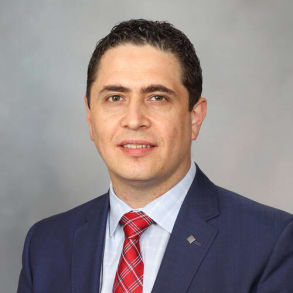Metabolic surgeons Omar M. Ghanem, M.D., and Todd A. Kellogg, M.D., discuss how Mayo Clinic treats patients who require weight-loss surgery with a multidisciplinary, team approach. Through this collaborative environment, the team is able to assist even the most complex patients in regaining their lives.
Bariatric surgery is one of the main modalities that we have to treat weight gain and obesity. We know from all the studies in the past that have been done that bariatric surgery is the most efficient and most durable modality for weight loss. As a tertiary center, we see some quite complex cases cases that perhaps the patient has had 12 or even three previous operations. And we are asked to assess that patient and see if there's anything that can be done to improve their quality of life. Having a multidisciplinary team behind us is really helpful to that end. We can really help a lot of people with a multidisciplinary effort that otherwise those patients probably wouldn't be able to get the help. The special thing about bariatric surgery or weight loss surgery is that patients lose about 30% of their total weight is about one third of their weight. About 75-80% of patients keep that weight off up to five years. A candidate for bariatric surgery would be the patient who has medically complicated obesity. And what we mean by that is either a body mass in more than 40 kg per meter squared. And that could be with or without co morbid diseases or a body mass index over 35 kg per meter squared with co morbid diseases. And that is generally the candidates for surgery. What is there for other institutions is something probably familiar for Mayo clinic providers. The reason is that we take care of a lot of the rare pathologies and diseases. And this applies to the field of weight loss surgery as well because we have top multiple providers and multiple specialties. We all sit together brainstorm discuss with the patient and then come with a plan to make sure that the patient will regain their life back after they are discharged from Mayo clinic. Our program is fairly unique in that to prepare the patient for surgery. They go through a series of steps of graded steps whereby they're counseled. They have their medical needs addressed and it's determined whether they may need something other than surgeries such as an endoscopic intervention or even weight loss medications. Once we shepherd them through that journey to the operation, if that's what's appropriate for that patient, then we're sure to shepherd them after the operation to ensure that they continue to use their tool which is their bariatric operation in the appropriate way to maximize their benefits. Their continuation of care is usually offered back by the local physician. Now the local physician may say I need help. We are there, we are ready to help. But that patient got referred to us for a specific issue. And once that specific issue is resolved, the patient and the local physician have the option to go back to the previous strategy they were doing at their hometown


